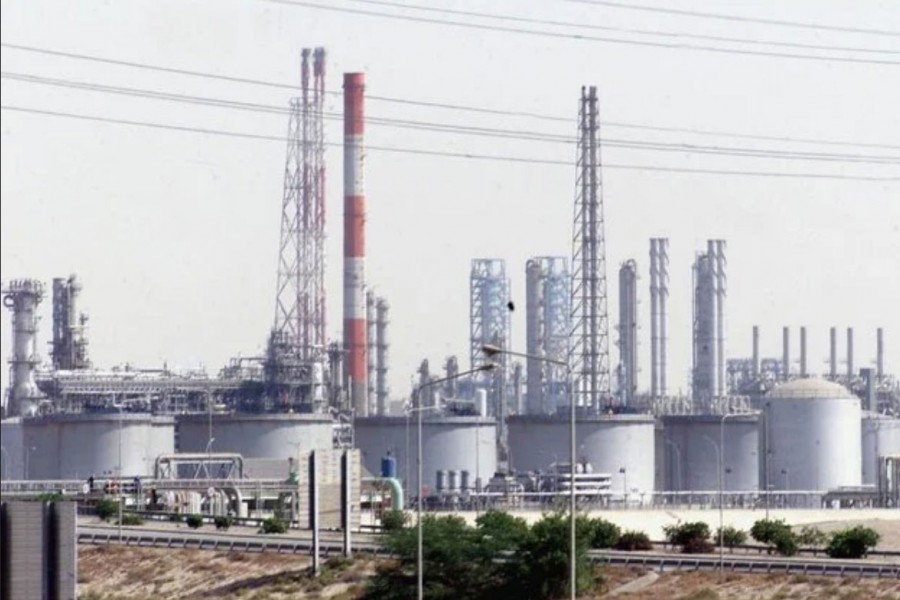Bangladesh Petroleum Corporation (BPC) has been trying to procure and store at least 10 days' reserve for petroleum products (estimated 0.11 million tonnes) taking the advantage of the 'very low' international fuel oil price.
Published information indicates that the price of one barrel of Arab Light oil was $16.01 and that of Murban oil was $19.04 on April 23, 2020 indicating the price reduction of 45-50 per cent, respectively, in just one month. These two brands are the preferred brands for BPC. As per established practice, BPC buys 50.0 per cent of oil through government-to-government agreements and the remaining 50.0 per cent through open tenders. To meet the demand in the country, an average of 0.5 to 0.6 million tonnes of fuel oil is imported every month.
The COVID-19 pandemic has pushed the prices petroleum products down primarily due to over-supply and unprecedented low demands worldwide. The attempt to prevent the spread of coronavirus pushed many countries into complete or partial loack down of business activities and people's movement resulting in reduced fuel use. The unprecedented drop of the US benchmark petroleum WTI (West Texas Intermediate) price on 20 April 20, 2020 setting a negative $37.63 per barrel was a historic event. The WTI negative price means the sellers are paying money to the buyers for taking the oil from sellers possession. Since the starting of trading in NYMEX in 1983, there was no record of such low oil price. Analysts identify three reasons for the record-minus price of oil in the US market for WTI petroleum. The major factors for the oil price crush is linked to the huge decline of oil demand in the global market since the start of coronavirus pandemic. The petroleum sector analysts state that global demand had squeezed to nearly 30 million barrels a day from its usual levels of approximately 100 million barrels a day before the corona pandemic emerged. At the same time oil rigs continued pumping oil more than the world currently needs. Secondly, the petroleum storage facilities have been filling up first and there is a fear that no more space would be available for additional supply. The third reason was linked to the market traders' deadline ( April 20, 2020) when they finally need to settle buy and sale orders for May 2020. The buyers came to the realisation that they need no more oil but there were many offers.
WTI is the American benchmark and not necessarily negative price for WTI brand automatically pushes down the Brent Crude or Ural Crude (Russian) market prices. However the price crush of WTI on April 20, 2020 was reflected on the other petroleum markets the following day. Brent crude has slipped to below $20 per barrel. In the meantime, Russia, Saudi Arabia and other major petroleum producers have agreed on a deal to take out of the market 9.7 million barrel of oil starting from the May 01, 2020. This agreement helped to arrest the free fall of oil price in the market.
On the other hand, oil demand gradually started to regain and experts believe it will continue to grow as the major economies of the world including the USA, China, Italy and Spain, Germany, Australia have started to relax lockdown in their respective countries. The oil market has been slowly returning to its normal state. But experts are cautiously optimistic and consider that the market price of oil will not go back to pre-crisis period of Corona pandemic in 2020.
Although the world market remains favourable, BPC can hardly build up a good reserve. BPC's petroleum storage systems are almost full as the countrywide semi lockdown is continuing from March 26, 2020 to help prevent the spread of corona virus. A published report suggests (April 22, 2020) that BPC had nearly 0.94 million tonnes of fuel oil against its total storage capacity of 0.95 million tones. The semi lockdown situation in the country has reduced the demands for petroleum products including diesel, petrol, jet oil, kerosene, furnace oil etc., significantly as the major part of transports, agriculture, industries and businesses except emergency and essential services remain shut. BPC sources suggests that the demand for diesel oil has reduced to only 6,000 tonnes, demand for jet oil has come down to only 81 tonnes during April 2020 while 13,000 tonnes of diesel and 1,239 tonnes of jet oil were used in April last year in the country. The Chattogram Customs House data suggest that BPC imported 0.68 million tonnes of diesel and 0.33 millions tonnes of crude oil during January - April 23 this year. On the contrary, 1.07 million tonnes of diesel and 0.37 million tonnes of crude oil were imported respectively by BPC during the same period in 2019.
Mushfiqur Rahman is a mining engineer and writes on energy and environment issues. [email protected]


